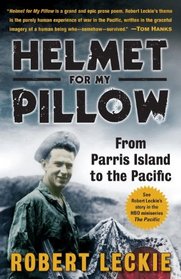An excellent accounting of the 1st Marines and their island campaigns.PFC Robert Leckie provides insight from boot camp until his being wounded bad enough at Peleliu that his war ends. He introduces a number of characters, some only get mentioned in a paragraph or two while others continue throughout the pages. If you appreciated the HBO miniseries "The Pacific" now is the time to get an unadulterated version of what happened on Guadalcanal and Peleliu and the island fighting in between.
If you are a Marine, were one---as I was---or want to be one, then this book is a must read. It's about the author and other ordinary Marines in World War II.
But if you want to read about what the Marine Corps accomplished in World War II, then read Leckie's "Strong Men Armed."
But if you want to read about what the Marine Corps accomplished in World War II, then read Leckie's "Strong Men Armed."
This book is said to be a personal account of WWII and perhaps it is. The entire book is Leckie's personal experiences during the war, with some excellent stories and trivia points. But the majority of those stories seem to be either of their training before being shipped out or their times on leave in Australia. I'm not discounting those time periods, but I'm 200 pages into a 300 page book and less than 100 pages have not been stories about various drinking, women or mischevious rule-breaking exploits.
I had a very hard time getting into this book and almost decided not to finish it. However, there are some excellent tidbits about a Marine's life that are generally not found in second-hand accounts and can be rare even in first-hand accounts. Everyday things such as sleeping and eating seem obvious when you don't think about it, but in the course of his stories, Leckie talks about they managed to find sleep in the Pacific rainy season or about various trips to other camps to get food (it's not stealing if you're fighting on the same side). Those tidbits are the reason I'll finish this book, they completely make it worth the read to me.
To be honest, I suppose part of the reason I'm not truly enjoying this book has little to do with the content. Leckie, throughout the entirety of the book, doesn't refer to anyone as their given name. He doesn't even mention anyone's given name, just a nickname. At times, especially with senior officers, it's difficult to tell whether these were nicknames used for them during the war or he just assigned them afterwards. There are perhaps half a dozen photos of individual marines which have both the nickname and given name of the subject, but nothing in the text. Leckie grants them such names as Hoosier, Runner, Chuckler, Lieutenant High-Hips, Smoothface, Oakstump, the Gentleman, the Artist, Lieutenant Racehorse, Straight-Talk, Broadgrin, McCaustic, Big-Picture ... Well, you get the idea. To me, it makes it difficult to feel a connection to the individuals when I partly feel like I'm reading about comic book characters.
All in all, it's not a bad read, provdided the lack of names doesn't bother you as it does me. While Leckie does tend to wax poetic at times, he truly does give an interesting account of the men he fought with and their interactions together, as well as their spirits and survival techniques during their time fighting.
I had a very hard time getting into this book and almost decided not to finish it. However, there are some excellent tidbits about a Marine's life that are generally not found in second-hand accounts and can be rare even in first-hand accounts. Everyday things such as sleeping and eating seem obvious when you don't think about it, but in the course of his stories, Leckie talks about they managed to find sleep in the Pacific rainy season or about various trips to other camps to get food (it's not stealing if you're fighting on the same side). Those tidbits are the reason I'll finish this book, they completely make it worth the read to me.
To be honest, I suppose part of the reason I'm not truly enjoying this book has little to do with the content. Leckie, throughout the entirety of the book, doesn't refer to anyone as their given name. He doesn't even mention anyone's given name, just a nickname. At times, especially with senior officers, it's difficult to tell whether these were nicknames used for them during the war or he just assigned them afterwards. There are perhaps half a dozen photos of individual marines which have both the nickname and given name of the subject, but nothing in the text. Leckie grants them such names as Hoosier, Runner, Chuckler, Lieutenant High-Hips, Smoothface, Oakstump, the Gentleman, the Artist, Lieutenant Racehorse, Straight-Talk, Broadgrin, McCaustic, Big-Picture ... Well, you get the idea. To me, it makes it difficult to feel a connection to the individuals when I partly feel like I'm reading about comic book characters.
All in all, it's not a bad read, provdided the lack of names doesn't bother you as it does me. While Leckie does tend to wax poetic at times, he truly does give an interesting account of the men he fought with and their interactions together, as well as their spirits and survival techniques during their time fighting.




